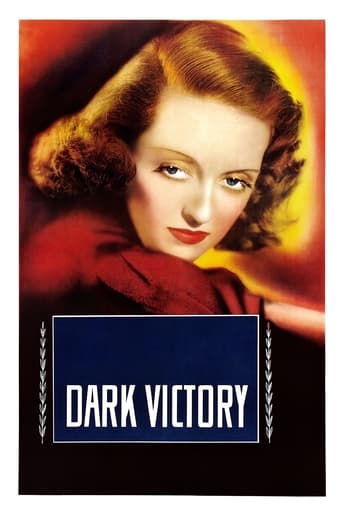weezeralfalfa
I don't understand the wording of the title. Near the end, Bette says something about they(she and George Brent) had achieved a victory over darkness, presumably meaning despair over her certain impending death from glioblastoma cancer.
Before her diagnosis, she had been a carefree, wealthy, heiress, only interested in entertaining herself and friends. After the said successful operation, she returned to her old self for awhile, until she happened upon the folder with details of her case. She was livid at the deceit of her surgeon and lover: Dr. Steele(Brent) and her best friend , Ann King(Geraldine Fitzgerald). After a period of telling sarcasm and extreme hate, she finally realized that they were trying to do her a favor.
Bette had her favorite leading man and sometimes lover present in Brent, who costarred with her in eleven films. He had a disquieting way of staring at a person before acting or speaking. Bogie, as her longtime horse trainer, had a very subsidiary role, revealing, during Bette's period of despair, his suppressed love for her.
My cousin died of this incurable cancer not long ago. He was lucky he experienced minimal symptoms before succumbing. Even for those who experience some of the symptoms, it's a relatively brief and painless cancer, and some remarked that they might wish to die of this disease.
cdcrb
bette davis was the biggest star of her time. everyone cites "all about eve" as her greatest performance, but if you want to see an actress displaying all her talents, subtley, watch this film. it's soap opera all the way, but bette raises the stakes so high, you really don't notice. when she's not on screen, you wonder why. of course, this was GWTW's year, so bette was passed over for the big prize.
jjnxn-1
Bette Davis' personal favorite amongst her films this lovely picture is kept from slipping into melodrama too deeply by her insightful work. True she gets her big flashy moments but it is her quiet simple ones that score the most with the viewer in their understated simplicity. A flop on stage for Tallulah Bankhead this has what that didn't in the character of the faithful friend Ann, played beautifully by Geraldine Fitzgerald, who can rail at the fates so Bette's character Judy doesn't have to bemoan her troubles and seem a self pitying crybaby. Instead she is a life loving dynamo caught in a tragic situation who meets the challenge and finds peace. George Brent is adequate, as always, but even a stronger leading man would have been put in the shade by Bette here in what is one of her best if not the best performance in a career filled with so many. Reagan, an actor of limited skill, is the most relaxed and likable he would ever be on screen. Humphrey Bogart's Irish stable hand isn't quite the blight on a work of art that he himself considered it but there is not question that he is miscast and he sticks out like a sore thumb. A wonderful film with an ending that is wrenching and deeply beautiful at the same time.
wes-connors
Long Island heiress Bette Davis (as Judith Traherne) suffers from headaches and vision problems, but doesn't want her partying, socialite lifestyle hampered by doctor's visits. However, after falling off her horse and down the stairway, Ms. Davis' family physician arranges for her to visit brain specialist George Brent (as Frederick Steele). Her self-described "reasonable quantity" of tobacco and alcohol does not seem to be a factor in Davis' declining health. Dr. Brent finds Davis in dire straits and operates on her brain almost immediately. The two fall in love, also...Davis seems to recover, but finds a file describing her condition as "prognosis negative." She asks, "What does prognosis mean?" and "What does negative mean?" Really...This film confirmed Davis as a box office favorite; she was listed in the annual top ten "Quigley Poll" for the first time, in sixth place. Davis' performance was in the running for year's best, behind "Academy Award" winner Vivien Leigh ("Gone with the Wind") and "New York Film Critics" runner-up Greta Garbo ("Ninotchka"). "Dark Victory" is a marvelous movie star performance vehicle, but less of a film. Davis receives great support from Brent and especially Geraldine Fitzgerald (as Ann King). Irish-accented Humphrey Bogart (as Michael O'Leary) is amusing.******** Dark Victory (4/20/39) Edmund Goulding ~ Bette Davis, George Brent, Geraldine Fitzgerald, Humphrey Bogart






